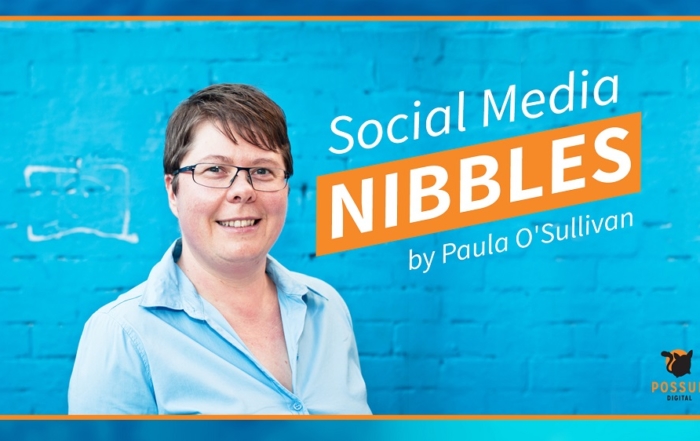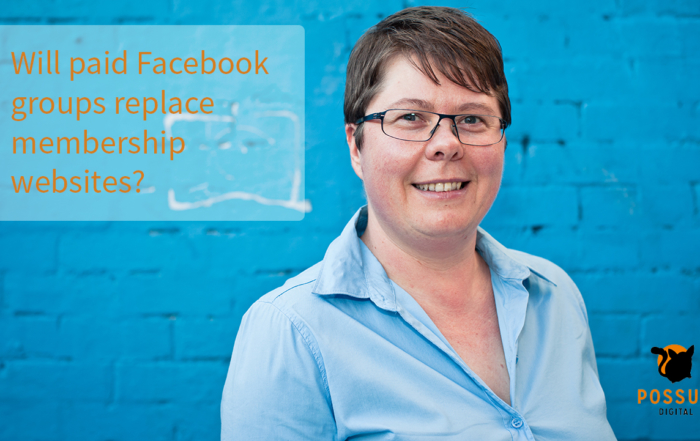
Jun 26, 2018 | Blog, News
Social Media Nibbles E05: Should you use Facebook groups?
Paula: Hello! And welcome to Social Media Nibbles. I’m Paula O’Sullivan , Social Media Strategist and head possum at Possum Digital. In this episode we have a very special guest: the wonderful Kate Toon. An award winning SEO copywriter and SEO consultant with almost two decades of experience in all things advertising, digital and writing. Originally from the UK but now based just outside of Sydney. She’s worked with big brands such as eHarmony, Curash and Kmart, and she’s helped countless more businesses produce great content and improve their copywriting and SEO. Kate is also the founder of the Clever Copywriting School and the Recipe for SEO Success eCourse. The Cohost on Hot Copy podcast and host of the Recipe for SEO Success podcast. Kate recently published her very popular business book ‘The Confessions of a Misfit Entrepreneur’ and personally I have read the book and can highly recommend it, so make sure you get yourself a copy, which also has its own podcast. And I am so super excited that she is with us to talk about how to use Facebook groups to support growing your business! Welcome Kate Toon!
Kate: Hello! I’m very excited to be here, thank you for having me.
Paula: You’re very welcome. So firstly, let’s give a shameless plug for you. Tell us a bit more about you, who you are, what you do and how you help.
Kate: I help small businesses, bloggers, corporates, charities, advertising agencies and basically anybody who wants to get more visible in the eyes of Google. People who wanna make Google fall in love with their website and I do that via courses, podcasts and resources. So that’s one of my businesses, my other business is I help copywriters create better businesses and collaborate, and try to build a sense of community and non competition and I have a conference that I run about that as well. And what else do I do? I’ve got books and speaking stuff and I don’t know, I don’t know what I do to be honest Paula, it’s all a blur today but, you know, that kind of thing.
Paula: Well that’s business life though isn’t it?
Kate: It is a bit. It is a bit.
Paula: It is a bit. Let’s jump in to Facebook groups. So, I personally am a member of a couple of your groups, but can you tell us what Facebook groups you use to support your business, and how you actually use them?
Kate: Okay so they fall in to two catergories basically: free and paid. I’ll talk about the free ones first. I’ve got a large group called I Love SEO which is there to support my free SEO courses and my low cost SEO courses. So it’s kind of an area to get tips and advice and support and ask questions. So that’s a large one that’s got nearly six thousand people in it.
Kate: And then I’ve got another group called Misfit Entrepreneurs, which was created originally to support my journey towards publishing my book, and was supposed to be for people who’d read the book but kind of now the edges have blurred a little bit on that, and that one’s free as well. Just a fun place to hang out.
Kate: And then I have several, I wouldn’t say they’re paid Facebook groups, but they’re groups that support a paid product. So I have a community for copywriters, a membership community, I have a membership community for my graduates of my SEO course, and then I also use Facebook groups for each round of the SEO course to support members while they’re doing it. So all the Facebook groups, I think I’ve got about 7.
Paula: So in terms of the paid Facebook groups, they obviously generate an ROI because they are paid customers or paid clients. Your free groups, so your ‘I love SEO’ group and your ‘Misfit Entrepreneurs’ group, how do you see those free groups as adding value to your business or generating some sort of, ROI or return on your time? Because you spend a lot of time in those groups.
Kate: Yes, and that is not necessarily because of the money, it’s also because I enjoy it. And I’m a big believer you should enjoy your business and do what you love, and it’s great if that can make you money but sometimes it doesn’t and that’s okay too. I guess they’re both very different again, so the SEO group: It’s an easy access to the world of Kate Toon. Yeah? So its very easy for me to pop in to other groups, or to mention any emails or to mention “Hey I have this group”, and, you know, there’s very little barrier to entry. Do you know what I mean? Joining a Facebook group is very low commitment. I must apologize for the dog in the background, he loves to join in on podcasts. It’s not my dog, he’s the bane of my existence.
Kate: So, yeah that one is a low entry way in to my groups, into my products, my funnel. Did I just say the F word?
Kate: And obviously it’s a place for me to gather my ideal customers, rather than having to go in to other groups and toot my horn, I have a room of people waiting to hear my horn being tooted. Also I can answer questions, I can share videos, I can show my authority, build trust, so that when I do have something to sell, that journey is already begun, you know?
Kate: The Misfits group is very different. So that was literally created to sell books, and it does a horrible job of selling books. So when people join I’m like “Hey, you can grab my book, here’s a free chapter.” The percentage of people who actually do buy the book, it’s very small. And I’m not sure why. I’ve pondered it but it got to the point where I’m like, it doesn’t matter, because in reality a lot of people in that group had then gone on to buy other things.
Kate: That group builds trust and authority in a very different way because most of the time I’m sharing pictures of hedgehogs or ugly selfies or just silly stuff. But a lot of people who’ve gone on to buy my big expensive courses actually came from that group, not the ‘I love SEO’ group. So it’s a little bit intangible, and I’m not somebody who tracks ROI on spreadsheets. I’m more of a vibe person. Which is probably not great marketing but it works for me.
Paula: Because you’ve got so many groups obviously you’ve gotta have some resources to actually tend to, maintain, cultivate, whatever buzz word you wanna use, but, basically look after your members and the people in those groups. What resources do you devote to managing your groups?
Kate: Yeah, the paid membership groups. So they’re people who have paid monthly or annual subscription to be there. So they get my love. They’re the ones that get the love and attention. So there are regular posts in the group, the obvious ones that everyone has like Monday intention and Friday wins, but we have other ones as well. I also regularly do Facebook Live, we have a coaching calls, and meet ups, and we hear our members and they do training and we do in group training. A whole range of stuff. Some of that is scheduled, so I have regular posts that can easily be popped into the group, and scheduled by a VA, but a lot of it is me. A lot of it is me turning up, you know? I’ve got enough people in there to make it OK for me to be spending about an hour a day in each of those groups helping and supporting. So a lot of that is me, I’m very much my brand, that I have a team of thousands.
Kate: And in the other groups, because they’re free, I feel zero pressure. I will do what I want, when I want to do it, and I will do stuff and then decide I’m not doing it again. So I have something in the I Love SEO group called a Help, and sometimes I schedule it, and sometimes I’m too busy with paper work and I’m not going to feel guilty about that. I just keep the level of expectation relatively low, and also that’s both from my customers point of view but from me. And just do what I can when I can, because at the end of the day I’ve got to earn money. So, you know. You can only do so much.
Paula: Exactly. And ultimately we’re all only human as well.
Kate: We are. We are.
Paula: So in your groups you have a nice little pinned post, which is good practice, and in the pinned post you talk about the rules of the game, and the rules of participating in the group. How do you deal with troublemakers, or people who just refuse to play by the rules?
Kate: I think it’s super important, before you set up a group … I’m just going to take a little step back from that question just a little bit, because I think in order for you to write the rules, you need to be very clear what you want to get out of the group. And I think so many people set up Facebook groups just because it’s another thing to do, like having a pretty Instagram feed, or whatever. Or like us, having a Podcast. It’s like everyone else has got one, I want one. And if you’re not very clear at the beginning about what you want to get out from it, then you won’t be able to set the rules and you won’t be able to apply them.
Kate: So I have basic rules around being polite and not swearing, or swearing or whatever. Rules about copyrite, rules about hashtags. I’m really anal about my hashtags. And that’s … and also, I must state as well, in my biggest group, because it is so big, I don’t allow any kind of free posting. Does that make sense?
Paula: Absolutely.
Kate: Every post is approved by me, when I choose to approve it or not approve. I just delete it. In the Misfits group it’s a bit different because anyone can post whenever they want. And that group causes me more headaches than any other group.
Kate: I’m just of the attitude that it’s my group, you have chosen to join it, there are rules, if you choose not to follow them you can leave the group. And I’m absolutely strict about that, and I know that sometimes that will put people off-side, and that’s something that you have to consider. So I’ve had to school a few people. And I’m sure they’ve gone away thinking, that Kate Toon is a right cow. And that’s not great, I don’t want that. But as long as I can go hey, refer to the post, it did say that, I did set that rule, you could have read it, you didn’t, it’s not really my fault, then I don’t feel too bad about it.
Kate: So I don’t allow really any promotion in my groups at all. Especially the SEO one, because I didn’t spend two years building a group of six thousand potential customers so that another SEO person can come in and start selling to them. I am of the spirit of abundance, but I am not stupid. And I think that’s a big problem that people have. If you have a group and you have a competitor come into it and start trying to sell to your customers, you can just get them out of the group. You have my permission. It is your space that you’ve created, you’ve dedicated time and resources, it is not fair. And it is not on, in my opinion. What do you think of that Paula?
Paula: Look I really love that as a philosophy, and I’ve been talking a lot about boundaries with friends and business colleagues and others at the moment, so I think before we jumped onto this call, onto this Podcast, we talked about a kinder world. What is it that we can do that actually has people behaving in a better way, in a kinder way to each other. And instead of going off and being that horrible person, or being that swear-y person, or whatever the bad behaviour is, how is it that we can make sure that the groups we’re in, or the groups we facilitate, or we own, it’s a space where people can come and be themselves, and feel safe, and have conversations, and do all those things. But also not be stupid about it-
Kate: Yeah.
Paula: And understand that this is your business. This is part of your marketing strategy, let’s be honest. Like your I Love SEO group, that’s part of your marketing strategy to sell your course, and there is absolutely nothing wrong with that. So, any competitor who thinks they can jump into the course and start promoting their own services, I would think that would just be bad behaviour.
Kate: Yeah. And I think there’s different types of bad behaviours. So people that swear and are mean and whatever, it’s just a no brainer. You just kick them out. You know? There’s no … And I don’t … In the beginning I’d be like, oh you know Sue I deleted your post because it bridged… these days I just delete it. And if someone contacts me and says what happened to my post, I’m like, what do you think happened? Do you know what I mean? Or I just don’t respond. Because they know what happened to their post. They know. They know. We all know when we’re breaking the rules.
Kate: And then when people self-promote in a group that’s someone else’s group … I’m in lots of peoples group who are digital marketers, copywriters, whatever. And why am I there? It’s interesting, and it’s good to see what’s going on. I have left any direct competitor groups. So somebody who sells SEO courses, I would not be in their group. Because why would I do that to myself? I’m just going to be doing comparison-itis, I could be accused of kind of nicking ideas, it’s just not good. Get out of your competitors groups. If competitors are in mine, I try to weed them out and I have no qualms about it. But I have a few people in my I Love SEO group who are SEO consultants, and who do offer similar services to me, and they are polite, and they are respectful, and they are there to learn and be part of a community, and that is cool.
Kate: So it’s just a balance. So you can’t be frightened of implementing your rules, otherwise don’t have the rules in the first place. And that’s where I see people getting into trouble. The people who find Facebook groups miserable, are those that agonise over how to police them. So if you’re just very black and white about it.
Kate: The other thing I’d say in terms of your kindness, and that kind of thing, is a group is only as good as its leader, yeah? People are looking for leadership. There’s nothing wrong with being a leader in your own group. That’s why people are there. So don’t be ashamed about putting yourself up front. But also you have to create that culture. You have to create a culture. And something like Misfits, in the early days it was difficult, but these days I can feel like I don’t have to monitor that over the weekend, because the group self-monitors. If someone comes in and behaves in a way that’s not the Misfit way, it stand out hugely, and I get all these notifications going, this persons just done a Facebook Live talking about their seven figure whatever, and they police the group themselves. Do you know what I mean?
Paula: So looking at the flip side to the good behaviour, and rewarding that, how do you think that culture was created? Were there certain tactics? Or was there anything you did in particular to make sure that the culture is collaborative, and kind, and wonderful, and all of those things?
Kate: Well I think I’m collaborative and kind, and wonderful, so I think that helps. No, I’m joking. I think in the early days, Sharon, who is just a wonderful human entity, was helping admin, and she and I had a lot of fun in that group but it was very gentle humour. We expressed things … When things went wrong we owned it. Like one time people were naming names of people and taking the micky out of them, and then someone would be like, hey I’m actually friends with that person. That’s not great. So I would go into the group and be like hey look, not going to do this people. Let’s not be those people.
Kate: And so owning your mistakes, and people saw those videos, and people saw those issues. And a few things blew up, a few posts blew up and went the wrong way. And again, it’s like closing that off and going I’m closing this conversation, it’s not helpful. Boom.
Kate: So we did lot of that. In the early days you have to police, police, police. You do notice that some people comment more than others. And if they are being useful, and helpful, and great, you don’t stop them doing that. In fact, what I do in my Misfits group is to try and pick a member a month and say, you’ve been awesome, you’ve commented heaps. You can do a big Facebook Live in the group and promote your butt off. You know, as a thank you.
Paula: Yeah.
Kate: I picked someone from the group to be an admin, a guy called Gavin. And that’s really interesting as well. A lot of the Facebook groups I’m in are women focused. You know? They’re all-
Paula: Interesting.
Kate: I didn’t want Misfits … Because I love blokes. I have a brother, and a great Dad, and lovely Husband and a Son, so I didn’t want to create a whole female environment. I wanted to create a human environment, where everybody felt safe and included and welcome. I’m a huge feminist, but that doesn’t mean I want to exclude men from my marketing. So the admin I picked was a bloke, and I think that brings a certain something to the group as well. So it’s hard. I think you just have to find your way, but the main thing is the confidence to make your decisions and live by them. Whether people like it or not. That’s the main.
Paula: A bit of personal responsibility, is what you’re saying?
Kate: Yes. Yes. And owning your mistakes, you know? Because you will make mistakes. And I’ve made oodles. But I just admit to them. And people are pretty forgiving. Most people, if you just say sorry, that’s all most people want to hear, you know?
Paula: Yeah. Absolutely. Well I think that’s a good note to end our interview on. Kate, you and I could gas bag all day I’m pretty sure. But thank you so much for your time today. I know you’re super busy, so I really appreciate it. Now let’s give you a chance to give a plug for yourself. Where can our listeners find out more about you?
Kate: The best place to go is KateToon.com. I’m in the process of redesigning it, so it’s pretty ugly, but you’ll find all my various bits. Or you can Google Kate Toon. Thankfully there aren’t too many other Kate Toons around, you should find something to do with me.
Paula: And to our listeners, thank you so much for listening. If you liked what you heard in this Podcast, please subscribe and share it with your friends. And make sure to visit our website, PossumDigital.com.au where you can listen to more Podcast episodes just like this one, and read our latest blogs. Thanks so much!

Jun 25, 2018 | Blog, News
Using reviews to grow your business
If you’re in business, you’ll know how important it is to toot your own horn to your potential customers. If you don’t say how brilliant you are at what you do, then who will? The short answers is – your customers! So let’s look at why reviews matter, and how you can use them to use your business.
For those of you who are reluctant to say how awesome you are, reviews are a much more gentle way of letting your prospective customers know that you are good at what you do. Additionally, this type of third party ‘social proof’ lends more credibility to you.
So here is how you can gain reviews for your business.
Encourage online reviews
When you’ve delivered a product or service that changes lives, and your customers are raving about it, then you should be asking them to leave a review online.
Ideally, your reviews would demonstrate what you do to help your clients, and how it impacts their lives. And the more specific the better.
I work with a copywriter who is incredibly talented, and the best thing she did is send me an email asking me to give her a review, and listed the links of where she wanted the reviews. You can do this to. The platforms you should cover off are:
- Google (because Google owns the online universe)
- Your Facebook page
- Your website
Show case studies on your website
To help potential customers understand what you do and how you help, case studies are a perfect tool for this.
What was the situation like for the clients BEFORE they found you? Take a photo of the before. Then as you are working with your customer, you can take progress shots (if it’s a long project). And then when you are finished, take a photo of the end results and get your customer’s feedback in writing or on video.
Use testimonials in your content
Once you have written (and hopefully some video!) reviews and case studies, you should use them across all of your online channels. Use a platform like Canva to whip up a template where you can drop in a quote or testimonial from a client.
For case studies, write a blog article, or create a video, so you can post the link across social media.
Over to you
Do you have a way to collect and use reviews from your customers?





